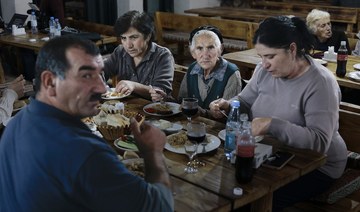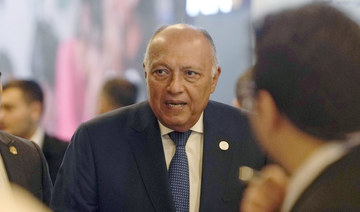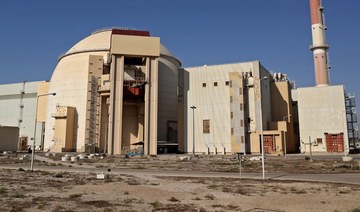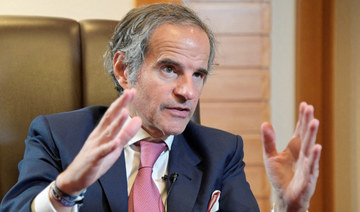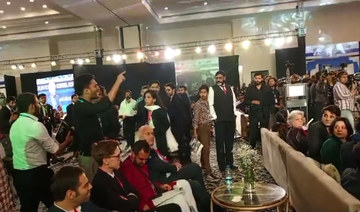YEREVAN: Thousands of Armenians streamed out of Nagorno-Karabakh after the Azerbaijani military reclaimed full control of the breakaway region while Turkish President Recep Tayyip Erdogan visited Azerbaijan Monday in a show of support to its ally.
The Azerbaijani military routed Armenian forces in a 24-hour blitz last week, forcing the separatist authorities to agree to lay down weapons and start talks on Nagorno-Karabakh’s “reintegration” into Azerbaijan after three decades of separatist rule.
A second round of talks between Azerbaijani officials and separatist representatives began in Khojaly Tuesday following the opening meeting last week.
While Azerbaijan pledged to respect the rights of ethnic Armenians in the region and restore supplies after a 10-month blockade, many local residents feared reprisals and said they were planning to leave for Armenia.
The Armenian government said that 4,850 Nagorno-Karabakh residents had fled to Armenia as of midday Monday.
“It was a nightmare. There are no words to describe. The village was heavily shelled. Almost no one is left in the village,” said one of the evacuees who spoke to The Associated Press in the Armenian city of Kornidzor and refused to give her name for security reasons.
Moscow said that Russian peacekeepers in Nagorno-Karabakh were assisting the evacuation.
Azerbaijan’s Defense Ministry said Monday that two of its soldiers were killed a day earlier when a military truck hit a land mine. It didn’t name the area where the explosion occurred.
In an address to the nation Sunday, Armenian Prime Minister Nikol Pashinyan said his government was working with international partners to protect the rights and security of Armenians in Nagorno-Karabakh.
“If these efforts do not produce concrete results, the government will welcome our sisters and brothers from Nagorno-Karabakh in the Republic of Armenia with every care,” he said.
Demonstrators demanding Pashinyan’s resignation continued blocking the Armenian capital’s main avenues Monday, clashing occasionally with police.
Russian peacekeepers have been in the region since 2020, when a Russian-brokered armistice ended a six-week war between Azerbaijan and ethnic Armenian forces in Nagorno-Karabakh.
Pashinyan and many others in Armenia accused the peacekeepers of failing to prevent the hostilities and protect the Armenian population. Moscow rejected the accusations, arguing that its forces had no legal grounds to intervene, particularly after Pashinyan’s recognition of Nagorno-Karabakh as part of Azerbaijan.
“We are categorically against attempts to put the blame on the Russian side, especially the Russian peacekeepers, who have shown a true heroism,” Peskov said in a conference call with reporters.
He demurred when asked whether the Russian peacekeepers would remain in the region, saying that “no one can really say anything for now.”
Nagorno-Karabakh came under the control of ethnic Armenian forces, backed by the Armenian military, in separatist fighting that ended in 1994. During the war in 2020, Azerbaijan took back parts of Nagorno-Karabakh along with surrounding territory that Armenian forces had claimed during the earlier conflict.
In December, Azerbaijan imposed a blockade of the only road connecting Nagorno-Karabakh with Armenia, alleging that the Armenian government was using the road for mineral extraction and illicit weapons shipments to the region’s separatist forces.
Armenia charged that the closure denied basic food and fuel supplies to Nagorno-Karabakh’s approximately 120,000 people. Azerbaijan rejected the accusation, arguing the region could receive supplies through the Azerbaijani city of Aghdam — a solution long resisted by Nagorno-Karabakh authorities, who called it a strategy for Azerbaijan to gain control of the region.
On Sunday, French President Emmanuel Macron pledged support for Armenia and Armenians, saying that France will mobilize food and medical aid for the population of Nagorno-Karabakh, and keep working toward a ‘’sustainable peace’’ in the region.
France, which has a big Armenian diaspora, has for decades played a mediating role in Nagorno-Karabakh. A few hundred people rallied outside the French Foreign Ministry over the weekend, demanding sanctions against Azerbaijan and accusing Paris of not doing enough to protect Armenian interests in the region.
“France is very vigilant about Armenia’s territorial integrity because that is what is at stake,” Macron said in an interview with France-2 and TF1 television, accusing Russia of complicity with Azerbaijan and charging that Turkiye threatens Armenia’s borders.
Russia has been the main ally and sponsor of Armenia and has a military base there, but it also has sought to maintain friendly ties with Azerbaijan. But Moscow’s clout in the region has waned quickly amid the Russian war in Ukraine while the influence of Azerbaijan’s top ally Turkiye has increased.
Erdogan arrived in Azerbaijan’s Nakhchivan exclave on Monday for talks with Azerbaijani President Ilham Aliyev to discuss Turkiye-Azerbaijan ties and regional and global issues. Nakhchivan is cut off from the rest of Azerbaijan by Armenian territory but forms a slim border with Turkiye.
During his one-day trip to the region, Erdogan will also attend the opening of a gas pipeline and a modernized military base, his office added in a statement.
Asked about Erdogan’s visit, Peskov, the Kremlin’s spokesman, voiced hope that it will “contribute to the regional security and help normalize life in Karabakh.”
Thousands of Armenians flee Nagorno-Karabakh as Turkish president visits Azerbaijan
https://arab.news/z2jx8
Thousands of Armenians flee Nagorno-Karabakh as Turkish president visits Azerbaijan
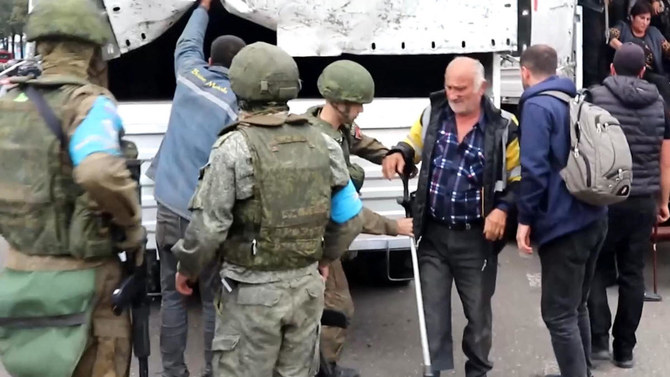
- Thousands of Armenians have streamed out of Nagorno-Karabakh after the Azerbaijani military reclaimed full control of the separatist region
- Turkish President Recep Tayyip Erdogan is visiting Azerbaijan in a show of support to its ally
Egyptian FM repeats call for two-state solution
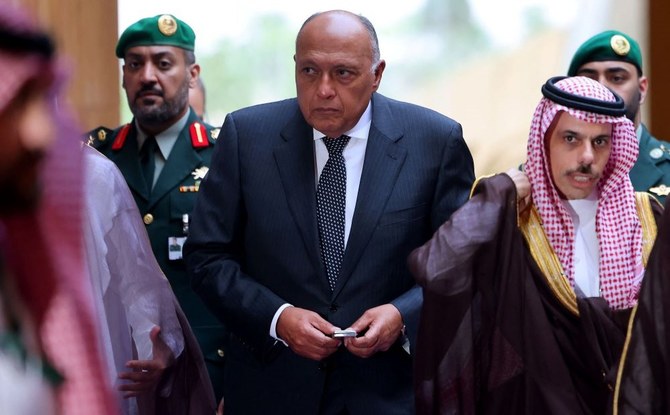
- Sameh Shoukry took part in a ministerial coordination meeting involving Arab and European countries
- Meeting, which discussed recognition of a Palestinian state, was held on the sidelines of the two-day WEF special meeting in Riyadh
CAIRO: Egypt’s foreign minister has repeated his call for a two-state solution to the Palestinian issue.
Sameh Shoukry on Monday took part in a ministerial coordination meeting involving Arab and European countries.
The meeting, which discussed recognition of a Palestinian state, was held on the sidelines of the two-day World Economic Forum special meeting in Riyadh.
Shoukry called on the international community to pressure Israel into ending its occupation of the Palestinian territories, and to support the legitimate and inalienable rights of Palestinians, said Ahmed Abu Zeid, the ministry’s spokesman.
Given the violence in Gaza and tensions in the West Bank, international parties must “assume their legal and human responsibilities to find a serious political horizon to establish a two-state solution and bring just and comprehensive peace to the region,” Shoukry added.
The foreign minister described the two-state solution as the “only path” toward peace between Palestinians and Israelis, as well as stability and coexistence among the peoples of the region.
IAEA chief Grossi to visit Iran May 6-8, Mehr says
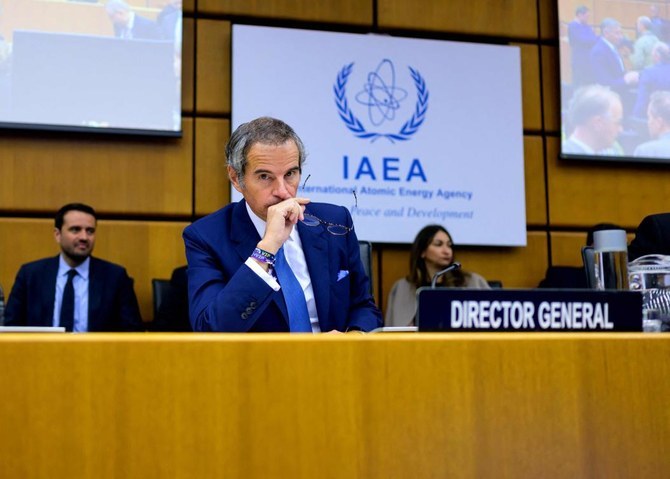
- Grossi will meet Iranian officials in Tehran before participating in the International Conference of Nuclear Sciences and Technologies held in Isfahan
- Enrichment to 60 percent brings uranium close to weapons grade
DUBAI: International Atomic Energy Agency chief Rafael Grossi is scheduled to visit Iran to take part in a nuclear conference from May 6-8 and meet Iranian officials, Iran’s Mehr news agency said on Tuesday.
“Grossi will meet Iranian officials in Tehran before participating in the International Conference of Nuclear Sciences and Technologies held in Isfahan,” the agency reported.
The IAEA chief said in February that he was planning a visit to Tehran to tackle a “drifting apart” in relations between the agency and the Islamic Republic.
Grossi said the same month that while the pace of uranium enrichment by Iran had slowed slightly since the end of last year, Iran was still enriching at an elevated rate of around 7 kg of uranium per month to 60 percent purity.
Enrichment to 60 percent brings uranium close to weapons grade, and is not necessary for commercial use in nuclear power production. Iran denies seeking nuclear weapons but no other state has enriched to that level without producing them.
Under a defunct 2015 agreement with world powers, Iran can enrich uranium only to 3.67 percent. After then-President Donald Trump pulled the United States out of that deal in 2018 and re-imposed sanctions, Iran moved well beyond the deal’s nuclear restrictions.
The IAEA said the 2015 nuclear deal was “all but disintegrated.”
‘We are with them’: Lebanon students rally for Gaza
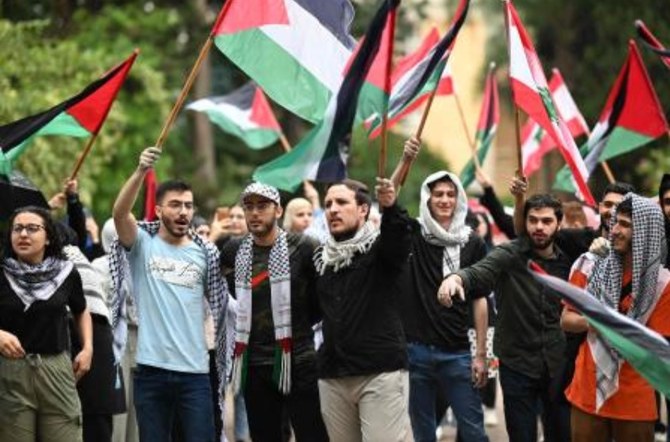
- “We are Palestine’s neighbors. If we do not stand with them today, who will?” asked AUB student Zeina
- Some students also carried banners declaring solidarity with south Lebanon, where Israel and Hamas-ally Hezbollah have exchanged near-daily cross-border fire since October
BEIRUT: Hundreds of university students in Lebanon protested on Tuesday against Israel’s bombardment of Gaza, inspired by recent pro-Palestinian demonstrations that have rocked US and European campuses, AFP correspondents said.
Dozens of students gathered at the prestigious American University of Beirut (AUB), some wearing the traditional Arab keffiyeh scarf that has long been a symbol of the Palestinian cause, an AFP photographer said.
“We are Palestine’s neighbors. If we do not stand with them today, who will?” asked AUB student Zeina, 23, declining to provide her surname.
“Around the world, students my age, from our generation, are the ones raising their voices,” she added.
The Gaza war began after Palestinian militant group Hamas’s unprecedented October 7 attacks on southern Israel, which resulted in the deaths of 1,170 people, mostly civilians, according to an AFP tally of Israeli official figures.
Hamas also took some 250 hostages. Israel estimates that 129 remain in Gaza, including 34 believed to be dead.
Israel’s retaliatory offensive, aimed at destroying Hamas, has killed at least 34,535 people in Gaza, mostly women and children, according to the health ministry in the Hamas-run territory.
The protests came as Hamas said it was considering a plan for a 40-day ceasefire and the release of scores of hostages in exchange for larger numbers of Palestinian prisoners.
Some students also carried banners declaring solidarity with south Lebanon, where Israel and Hamas-ally Hezbollah have exchanged near-daily cross-border fire since October.
The protests came as similar demonstrations swept universities across the United States, posing a challenge to administrators trying to balance free speech with complaints that the rallies have veered into anti-Semitism.
Footage of police in riot gear called in by universities to break up the rallies has circulated worldwide, recalling the protest movement that erupted during the Vietnam War.
“We renew our demand to stop the American-backed Israeli genocide against Palestinians and urgently demand to stop Zionist (Israeli) attacks” on south Lebanon, a female student told the crowd at AUB, praising “the global student movement supporting our people.”
At the nearby Lebanese American University, dozens of students gathered, raising Palestinian flags and burning an Israeli one.
“We want to convey a message to our people in Gaza: we are with them... We have not forgotten them,” Lara Qassem, 18, told AFP.
In Lebanon, at least 385 people have been killed in months of cross-border violence, mostly fighters but also including 73 civilians, according to an AFP tally.
Israel says 11 soldiers and nine civilians have been killed in the country’s north.
Arab-European ministerial statement: We endorse efforts toward achieving a Gaza ceasefire
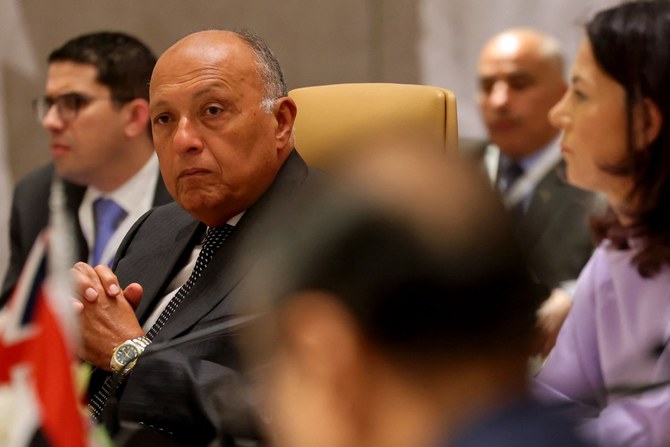
RIYADH: A joint statement from Arab and European foreign ministers highlighted critical priorities in addressing the ongoing conflict in Gaza, following a meeting in Saudi Arabia's capital, Riyadh, on Tuesday.
The statmenet called for the urgent need to halt all unilateral violations in Palestinian territories. It also called for the release of prisoners and hostages, putting an end to the war in Gaza and all illegal unilateral actions and violations in the occupied Palestinian territories, including East Jerusalem.
The meeting was chaired by Saudi Minister of Foreign Affairs Prince Faisal bin Farhan and Norwegian Foreign Minister Espen Barth Eide.
It was also attended by foreign ministers and representatives from Bahrain, Portugal, the European Union, Algeria, Jordan, Germany, the United Arab Emirates, Spain, Ireland, Italy, Belgium, Turkey, the Arab League, Slovenia, France, Palestine, Qatar, Egypt, and the United Kingdom.
Ministers reiterated their support for efforts aimed at achieving a ceasefire in Gaza. They emphasized the importance of establishing a unified Palestinian government in both the West Bank and Gaza.
Recognizing the significance of internal unity among Palestinians, the ministers have called for concerted efforts to overcome divisions and work towards a common goal of self-governance and statehood.
The statement also called for adopting a reliable and irreversible path towards implementing the two-state solution.
Arab and European foreign ministers were gathered in Riyadh on the sidelines of a two-day World Economic Forum special meeting.
Israel police say Turk shot dead after stabbing officer in Jerusalem
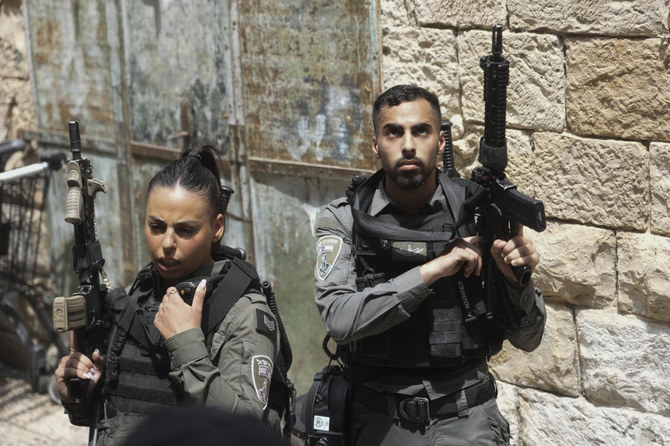
JERUSALEM: A Turkish national stabbed and moderately wounded an Israeli police officer in annexed east Jerusalem before being shot dead on Tuesday, police said.
Police said that a “terrorist armed with a knife arrived in the Old City of Jerusalem, on the Herod’s Gate Ascent street, charged at a border police officer and stabbed him with a knife.”
It said another officer at the scene “neutralized the terrorist” and the attacker was later pronounced dead.




